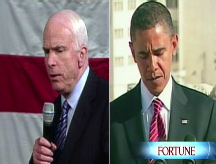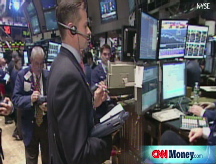Stocks struggle ahead of election
Wall Street seesaws after last week's advance as investors consider weak economic reports and look to Election Day.

NEW YORK (CNNMoney.com) -- Stocks seesawed Monday, as investors awaited the presidential election and mulled weaker oil prices, a stronger dollar and more signs that the economy is in a recession.
The Dow Jones industrial average (INDU) lost a few points. The Standard & Poor's 500 (SPX) index lost 0.3% and the Nasdaq composite (COMP) gained 0.3%.
Lending rates continued to improve, amid the efforts of U.S. and world governments to get money flowing again. Treasury prices rose, lowering the corresponding yields. Oil prices slipped and the dollar gained versus other major currencies.
Meanwhile, slumping manufacturing and construction activity, and plunging auto sales, added to bets that a recession is underway. In the afternoon, Dallas Federal Reserve Bank President Richard Fisher forecast that there will be no economic growth through 2009.
Additionally, in the afternoon, the government said it will borrow a record $550 billion in the fourth quarter and another $368 billion in the first quarter of next year as it looks to fund the massive financial rescue plans recently put in place.
Stocks rallied last week, finding some momentum at the end of one of the worst months in Wall Street history. For the week, the Dow was up 10.1%, the S&P 500 was up 9.5% and the Nasdaq had gained 9.8%.
The depth of last month's selloff has left some investors betting that a bottom has been put in place, said John Forelli, portfolio manager at Independence Investments. Yet, few people are ready to act on those bets yet, he said.
"Certainly no one is looking for positive news on the economy," he said. "The question is whether the market sold off enough considering the poor news."
Election: Investors were also playing it cautious Monday ahead of Election Day. Analysts say investors will be glad to have the election over and to know that a change in administration is coming, regardless of whether Republican John McCain or Democrat Barack Obama wins.
Although Wall Street would seem to prefer Big Business-friendly Republicans, studies have shown that stocks tend to do better under Democratic presidents than Republicans and best during times of gridlock, when one party controls the White House and another the Congress.
Yet, gridlock hasn't been much help for stocks over the last few years with Wall Street faltering despite the combination of Republican president George Bush and a Democratic-controlled Congress. Should Obama win, as polls suggest, and the Democrats retain control of Congress, the era of gridlock would be over for the time being.
(For more on where McCain stands on key issues, click here. For more on where Obama stands, click here.).
Economic news: The Institute for Supply Management's manufacturing index fell to a 26-year low of 38.9 in October from 43.5 in September. Economists thought it would fall to 42. The decline suggests a recession and echoes the weakness in recent regional manufacturing reports.
Another report showed that construction spending fell 0.3% in September, short of forecasts for a drop of 0.8%. Spending rose 0.3% in August.
A survey of top economists shows a majority believe the United States is in a recession and will remain in one through 2009.
Company news: A huge drop in October auto sales left the industry on track to post the worst monthly results in 25 years. (Full story)
General Motors (GM, Fortune 500) reported a 45% decline in October sales, versus a year ago. That was worse than the forecasts for a drop of 41%.
Ford Motor (F, Fortune 500) reported October sales plunged 30% versus a year ago. However, analysts were expecting an even bigger decline of 35%.
In other news, Hartford Financial Services (HIG, Fortune 500) rallied 58% in active New York Stock Exchange trade after the company said it is well-capitalized enough to maintain its debt-rating levels at the end of the year.
Circuit City (CC, Fortune 500) shares rallied 38% after the electronics retailer said that it was closing about 20% of its stores in a bid to return to profitability.
Market breadth was positive. On the New York Stock Exchange, winners beat losers nine to seven on volume of 1.02 billion shares. On the Nasdaq, advancers topped decliners four to three on volume of 1.83 billion shares.
No big market-moving earnings reports were released Monday morning. With roughly 69% of the S&P 500 results out, profits are currently on track to have fallen 11.7% versus a year ago, according to the latest data from tracking firm Thomson Reuters.
Other markets: In global trade, most Asian markets ended higher, while European markets also erased early losses to end higher.
The dollar fell against the euro and gained against the yen.
COMEX gold for January delivery climbed $8.60 to settle at $727.50 an ounce.
U.S. light crude oil for December delivery fell $3.90 to settle at $63.91 a barrel on the New York Mercantile Exchange.
Gasoline prices fell another 2.1 cents overnight, to a national average of $2.415 a gallon, according to a survey of credit-card activity by motorist group AAA. It was the 47th consecutive day that prices have decreased. During that time, prices have fallen by $1.44 a gallon, or 37.5%.
Lending rates: The credit market continued to improve, with Libor, the overnight bank-to-bank lending rate, falling to 0.39% from 0.41% Friday, according to Bloomberg.com. The 3-month Libor fell to 2.86% from 3.03% Friday.
The yield on the 3-month Treasury bill, seen as the safest place to put money in the short term, fell to 0.43% from 0.44% late Friday, with investors preferring to take a small return on their money than risk the stock market. Last month, the 3-month yield reached a 68-year low around 0% as investor panic peaked.
Treasury prices inched higher, lowering the yield on the benchmark 10-year note to 3.91% from 3.96% late Friday. Treasury prices and yields move in opposite directions. ![]()






